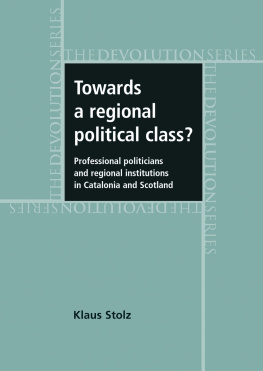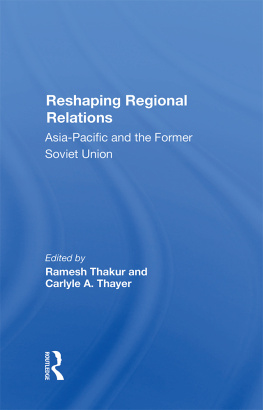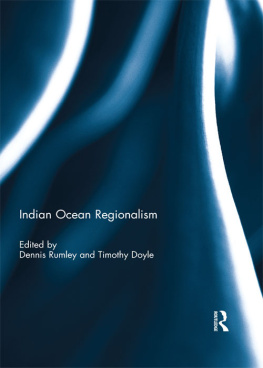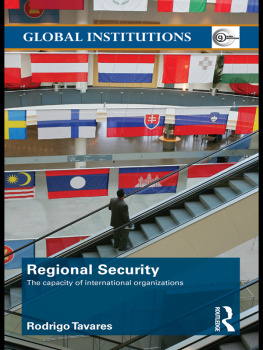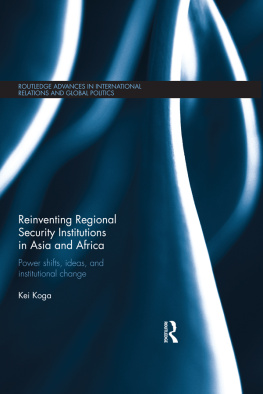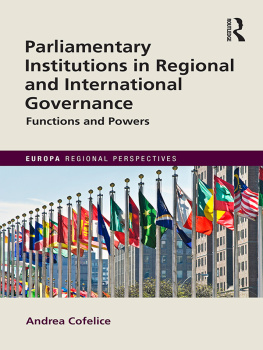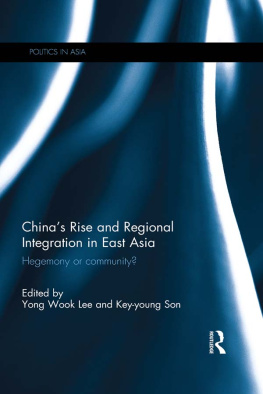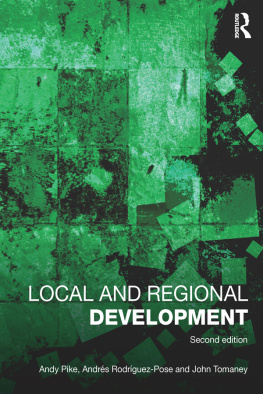Towards a regional political class?
DEVOLUTION series
series editor Charlie Jeffery
Devolution has established new political institutions in Scotland, Wales, Northern Ireland, London and the other English regions since 1997. These devolution reforms have far-reaching implications for the politics, policy and society of the UK. Radical institutional change, combined with a fuller capacity to express the UKs distinctive territorial identities, is reshaping the way the UK is governed and opening up new directions of public policy. These are the biggest changes to UK politics for at least 150 years.
The Devolution series brings together the best research in the UK on devolution and its implications. It draws together the best analysis from the Economic and Social Research Councils research programme on Devolution and Constitutional Change. The series has three central themes, all of which are vital components in understanding the changes devolution has set in train.
1 Delivering public policy after devolution: diverging from Westminster: Does devolution result in the provision of different standards of public service in health or education, or in widening economic disparities from one part of the UK to another? If so, does it matter?
2 The political institutions of devolution: How well do the new devolved institutions work? How effectively are devolved and UK-level matters coordinated? How have political organisations which have traditionally operated UK-wide political parties, interest groups responded to multi-level politics?
3 Public attitudes, devolution and national identity: How do people in different parts of the UK assess the performance of the new devolved institutions? Do people identify themselves differently as a result of devolution? Does a common sense of Britishness still unite people from different parts of the UK?
already published
Devolution and constitutional change in Northern Ireland
Paul Carmichael, Colin Knox and Bob Osborne (eds)
Beyond devolution and decentralisation
Alistair Cole
Between two Unions
Europeanisation and Scottish devolution
Paolo Dardanelli
Territorial politics and health policy
UK health policy in comparative perspective
Scott L. Greer
The English Question
Robert Hazell
Devolution and electoral politics
Dan Hough and Charlie Jeffery (eds)
Debating nationhood and government in Britain, 18851939
Perspectives from the four nations
Duncan Tanner, Chris Williams, Wil Griffith and Andrew Edwards (eds)
Devolution and power in the United Kingdom
Alan Trench
The Northern Veto
Mark Sandford (ed.)
Towards a regional political class?
Professional politicians and regional institutions in Catalonia and Scotland
Klaus Stolz
Copyright Klaus Stolz 2009
The right of Klaus Stolz to be identified as the author of this work has been asserted by
him in accordance with the Copyright, Designs and Patents Act 1988.
Published by Manchester University Press
Oxford Road, Manchester M13 9NR, UK
and Room 400, 175 Fifth Avenue, New York, NY 10010, USA
www.manchesteruniversitypress.co.uk
Distributed in the United States exclusively by
Palgrave Macmillan, 175 Fifth Avenue, New York,
NY 10010, USA
Distributed in Canada exclusively by
UBC Press, University of British Columbia, 2029 West Mall,
Vancouver, BC, Canada V6T 1Z2
British Library Cataloguing-in-Publication Data
A catalogue record for this book is available from the British Library
Library of Congress Cataloging-in-Publication Data applied for
ISBN 978 0 7190 7979 5
First published 2009
18 17 16 15 14 13 12 11 10 09 10 9 8 7 6 5 4 3 2 1
The publisher has no responsibility for the persistence or accuracy of URLs for any
external or third-party internet websites referred to in this book, and does not guarantee
that any content on such websites is, or will remain, accurate or appropriate.
Typeset by Servis Filmsetting Ltd, Stockport, Cheshire
Printed in Great Britain
by MPG Books Group, UK
Contents
Illustrations
Figures
Tables
Acknowledgements
In completing this study I have received support from a large number of institutions and individuals. The most substantial source of funding came from the Volkswagen Foundation, which, between 1998 and 2004, funded a research group on Politik als Beruf (Politics as a Profession) directed by Jens Borchert. The work in this group provided not only the material basis but also the intellectual stimulus for this study. I am indebted to the research group members Jens Borchert, Klaus Detterbeck, Susanne Koenen, Michael Ko, Jrg Lohse, Peter Matuschek, Marion Reiser, Dominik Schunk and Jrgen Zei for their benevolent criticism and constant encouragement. The final stages of this project were generously supported by a grant from the German Research Foundation (Deutsche Forschungsgemeinschaft) allowing me to concentrate on writing up the manuscript. I am very grateful to both these funding institutions.
During my research visits to Catalonia and Scotland I enjoyed the hospitality of the Department of Social and Political Sciences at the University Pompeu Fabra, Barcelona, and the Institute of Governance at the University of Edinburgh, where I felt very welcome as a visiting scholar. My thanks go to Francesc Pallars and David McCrone who were heading these institutions at that time, but also to Klaus-Jrgen Nagel and Paddy Bort who made sure that I felt at home in both these places. Special thanks go to my friend Liam McArthur and his family who were putting me up during my stays in Edinburgh, providing their German visitor with a couthie Scottish home and their enjoyable company.
There is one group of people without whose support this study would have been inconceivable: the politicians under investigation. I would like to thank all those who anonymously filled in my survey questionnaire and even more so all those who granted me an interview on their professional life and career, despite being not too keen to be portrayed as members of a political class.
Presenting different parts and versions of the study at international conferences and workshops I have received valuable comments from Heinrich Best, Gary Copeland, David Docherty, William Downs, Stefaan Fiers, Mark Jones, Andr Kaiser, Michael Keating, David McCrone, James Mitchell, Niels Lange, Werner Patzelt, Fabiano Santos, Roland Sturm and Bernhard Weels.
That the following text is a lot more readable and contains fewer mistakes than in its earlier versions is mainly due to the efforts of Jens Borchert, Andr Kaiser and Alan Lawson. Jens has not only inspired much of the conceptual thinking that set me on the way, he has also commented on many drafts in his innate constructive manner. Andr read through the whole text providing invaluable advice and criticism, always reminding me to bring the project to an end. He was a source of constant support. Alan has not only brushed up my English, but has also served as canny typesetter and handyman for last-minute questions. Further technical help was provided by Felix Lther and Ute Kalbitzer. I am grateful to all of them, for giving their time and enthusiasm to this project. However, any remaining faults are of course my own responsibility.

